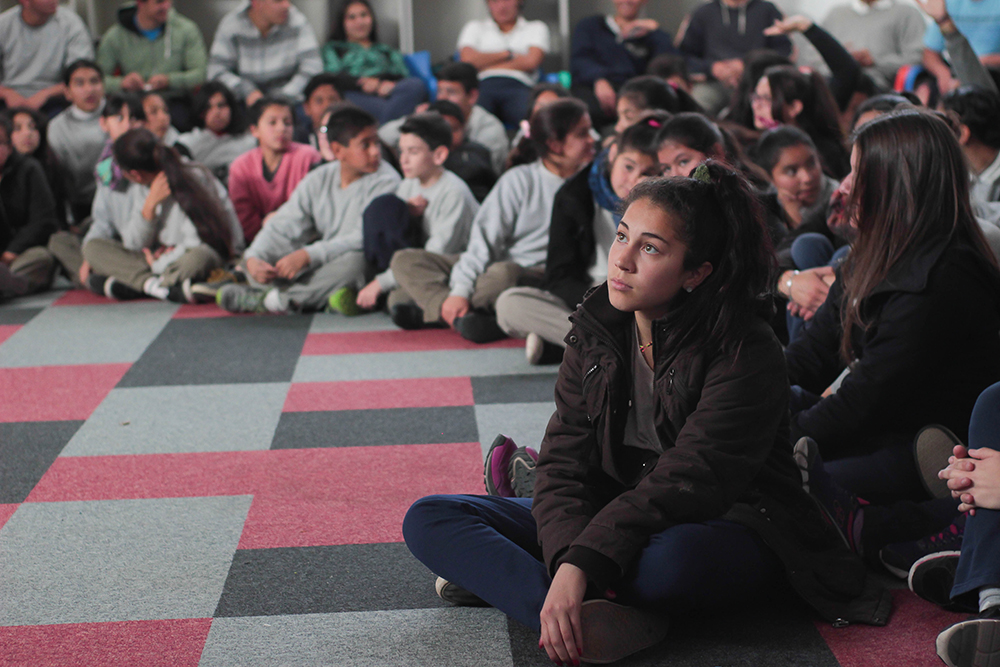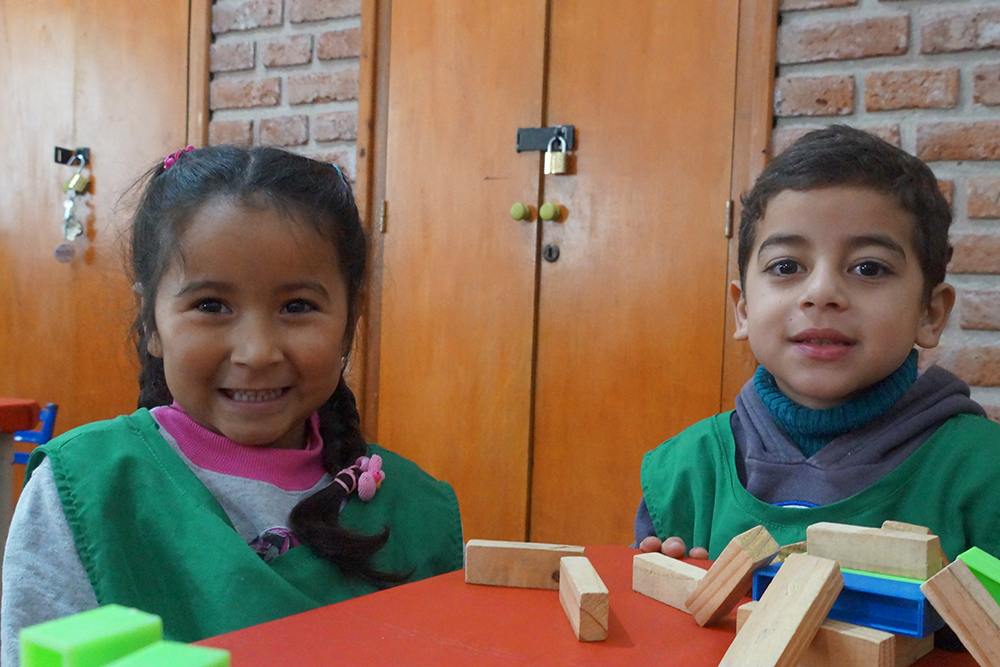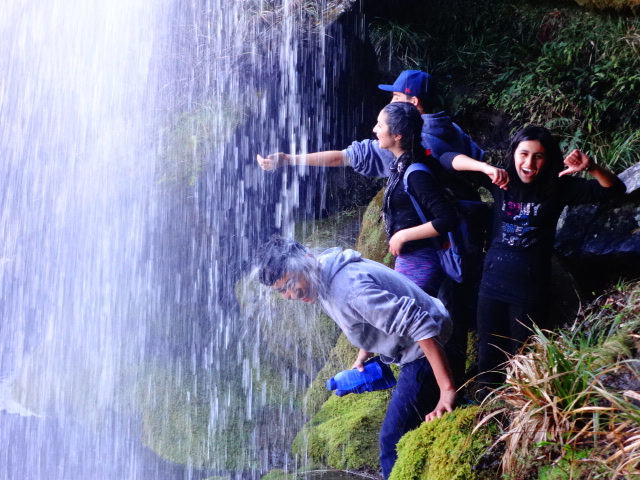INSTITUTO PADRE DOMINGO VIERA
Instituto Agrotécnico
En 2008, abre sus puertas el Instituto Agrotécnico Padre Domingo Viera con un Primer Año, y comienza a partir de allí un crecimiento continuo con un curso nuevo por año, consiguiendo su adscripción definitiva según Resolución DGIPE Nº 756/09. Durante los primeros tres años, todo el cuerpo docente donó sus honorarios para el crecimiento del proyecto.
El Instituto enfoca su actividad en los jóvenes con menores oportunidades de finalizar sus estudios, reivindicando el valor del esfuerzo personal como herramienta fundamental en la construcción de su propio proyecto de vida. Es por ello que el perfil del alumno que prioriza la escuela es: la pertenencia a un grupo social vulnerable, buen desempeño escolar en la institución de la cual proviene, buena conducta, demostrar gusto por el trabajo de campo. Para seleccionar a los ingresantes, se hacen entrevistas y visitas domiciliarias a un total de 100 preinscriptos, después de las cuales un equipo de personas, dirigido por la trabajadora social de la Fundación, evalúa caso por caso y define quiénes serán los 35 ingresantes.
Se asegura así un alumnado perteneciente mayoritariamente a grupos sociales vulnerables o de clase obrera (existe un grupo reducido perteneciente a otros sectores sociales, que ingresan cubriendo vacantes en cursos superiores, en caso de que no haya aspirantes de los sectores que se priorizan).
Como escuela de acción social, Fundación Effetá subvenciona la educación a través de actividades de campo y gestión de proyectos. El Instituto cobra una cuota mínima, pero brinda un amplio programa de becas gestionado desde la misma Fundación.
Acceden a este programa los alumnos que lo requieran a través de una ficha de solicitud. Una trabajadora social verifica la situación socio-económica del solicitante y le otorga beca completa o parcial, según corresponda.
Desde el Instituto se hace un seguimiento sistemático del cumplimiento por parte de los becarios de las condiciones establecidas en este programa (buen rendimiento académico y buena conducta).
Plan de Estudios:
En los tres primeros años los alumnos cursan las materias correspondientes al Ciclo Básico y las primeras materias que corresponden a la especialidad, ellas son:
- 1° Año: Módulo de Producción Vegetal: Huerta, Módulo de Producción Animal: Avicultura o Cunicultura
- 2° Año: Módulo de Producción Vegetal: Vivero y/o Aromáticas, Módulo de Producción Animal: Avicultura o Cunicultura
- 3° Año: Módulo de Industrias Agrícolas, Módulo de Producción Vegetal o Producción Animal
Las asignaturas que se cursan en el Ciclo Superior correspondientes a la especialidad son:
En el campo de la Formación Técnica Específica (FTE):
- 4° Año: Ciencias Naturales Aplicadas a la Producción Agropecuaria, Producción Vegetal I: Introducción a la Producción Vegetal, Producción Animal I: Introducción a la Producción Animal.
- 5° Año: Instalaciones Agropecarias, Producción Vegetal II: con opción a Horticultura, Fruticultura o Vivero, Producción Animal II: Porcinos.
- 6° Año: Maquinaria Agrícola, Producción Vegetal III: Forraje, Producción Animal III: Producción de carne con opción a Rumiantes Mayores o Menores.
- 7° Año: Formulación de Proyectos Agropecuarios, Producción Vegetal IV: Producción de Granos, Producción Animal IV: Producción de Leche con opción a Rumiantes Mayores o Menores, Industrialización de Productos Agropecuarios.
Dentro del Campo de Formación Científico Tecnológica (FCT) son:
- 6° Año: Análisis Matemático, Economía y Gestión de la Producción Agropecuaria, Nuevas Tecnologías Aplicadas a la Producción Agropecuaria.
- 7° Año: Inglés Técnico, Marco Jurídico de las Actividades Agropecuarias, Higiene y Seguridad Laboral.
En el campo de la Formación Práctica Profesionalizante (FPP)
7° Año: Formación en Ambiente de Trabajo
Escuela Inicial y Primaria
Habiendo detectado el bajo nivel académico y riesgo de abandono escolar de los niños provenientes de escuelas marginales, surge la inquietud de abordar la problemática de estos chicos desde el nivel inicial.
A partir de la donación de un predio cercano, la idea empieza a tomar forma y se arman equipos para trabajar sobre los aspectos edilicios y pedagógicos.
En 2017 se abrieron las salas de 4 y 5 años del Nivel Inicial en el edificio de una vieja escuela, otorgado en comodato por 10 años por la Municipalidad de Alta Gracia, y en 2018 abrimos el Primer Grado de la Escuela Primaria, para ir sumando un grado por año y ampliando nuestros horizontes para que, cada vez, una población mayor pueda verse beneficiada.
En 2024 nuestros primeros egresados de la escuela primaria entraron al Instituto Agrotécnico, completando así toda la currícula y concentrando la selección de ingresantes en el nivel inicial.
PADRE DOMINGO VIERA INSTITUTE
Agrotechnical Institute
In 2008, the Instituto Agrotécnico Padre Domingo Viera was opened with a First Year, and from that moment on the school did not stop growing , adding a new course per year and obtaining its definitive adscription according to Resolution DGIPE Nº 756/09. For the first three years, the entire faculty donated their fees for the growth of the project.
The Institute focuses its activity on young people with few opportunities to finish their studies, claiming the value of personal effort as a fundamental tool in the construction of their own life project. That is why the profile of the student the school prioritizes is that of a youngster who belongs to a vulnerable social group, who had a good academic performance and who also exhibited proper behaviour in the institution from which he/she comes, demonstrating a taste for field work as well. To select the applicants, interviews and home visits are made to a total of 100 pre-registrants after which a team, led by the foundation’s social worker, evaluates on a case-by-case basis and defines who the 35 entrants will be. This ensures a student body who belong mostly to vulnerable social groups or the working class, (there is a small group belonging to other social sectors, who fill vacancies that arise in the last years of secondary school, in case there are no applicants from the sectors that are prioritized).
As a school of social action, Effetá Foundation subsidizes education through field activities and project management. The Institute charges a minimum fee, but provides an extensive scholarship program managed by the Foundation itself. Students who require it access this program through an application form. A social worker verifies the applicant’s socio-economic status and awards him or her full or partial scholarship, as appropriate.
The Institute systematically monitors the compliance of fellows with the conditions established in this program (good academic performance and good behavior).
Curriculum:
In the first three years the students take the subjects corresponding to the Basic Cycle and the first subjects that correspond to the specialty, they are:
- 1st Year: Plant Production Module: Orchard, Animal Production Module: Poultry or Cunicultura.
- 2nd Year: Plant Production Module: Nursery and/or Aromatics, Animal Production Module: Poultry or Cunicultura
- 3rd Year: Agricultural Industries Module, Plant Production module or Animal Production
The subjects that are studied in the Upper Cycle corresponding to the specialty are:
In the field of Specific Technical Training (FTE):
- 4th Year: Natural Sciences Applied to Agricultural Production, Plant Production I: Introduction to Plant Production, Animal Production I: Introduction to Animal Production.
- 5th Year: Farming Facilities, Plant Production II: with option to Horticulture, Fruit Growers o Nursery, Animal Production II: Pigs.
- 6th Year: Agricultural Machinery, Plant Production III: Forage, Animal Production III: Meat production with option to Major or Minor Ruminants.
- 7th Year: Formulation of Agricultural Projects, Plant Production IV: Grain Production, Animal Production IV: Milk Production with option to Major or Minor Ruminants, Industrialization of Agricultural Products.
Within the Field of Scientific and Technological Training (FCT) are:
- 6th Year: Mathematical Analysis, Economics and Management of Agricultural Production, New Technologies Applied to Agricultural Production.
7th Year: Technical English, Legal Framework of Agricultural Activities, Occupational Health and Safety.
In the field of Practical Vocational Training (FPP)
7th Year: Training in the Working Environment
Initial and Primary School
Having detected the low academic level and risk of dropping out of school of children from marginal schools, the concern arises to address the problem of these children from the initial level.
From the donation of a nearby property, the idea begins to take shape and teams are assembled to work on the building and pedagogical aspects.
In 2017 the rooms of 4 and 5 years of the Initial Level were opened in the building of an old school, granted in commodified for 10 years by the Municipality of Alta Gracia, and in 2018 we opened the First Grade of the Primary School, to add one grade per year and expand our horizons so that, each time, an older population can benefit.































